Water Quality and Water Related Ecosystem Services in the Olifants ‑ South Africa: A qualitative approach
 Q-methodology of WES
Q-methodology of WESAbstract
Stakeholder perceptions about important water related ecosystem services are critical to improving water governance and quality, if they are to generate behavioral changes over the medium term. In particular, points of consensus and controversy must be identified, to facilitate negotiation when the need to address trade-offs among different services arises. This study investigates management of water pollution and other water related ecosystem services in the South African section of the Olifants river catchment. We developed an application of the Q methodology to identify and analyze the diverse perceptions about water related ecosystem services in the Olifants catchment across a panel of stakeholders (private, government, civil society, farmers, ecologists, etc.). It is based on individual interviews during which respondents are asked to sort a set of items, here the water ecosystem services, into a predefined distribution. A by-person factor analysis is then used to identify groups of individuals sharing distinct latent factors. In this study, these factors correspond to ranking of water ecosystem services from an extensive pre-defined list. Stated otherwise, we elicited perceptions and identified groups of individuals sharing distinct perspectives about important ecosystem services provided by the Olifants river catchment.